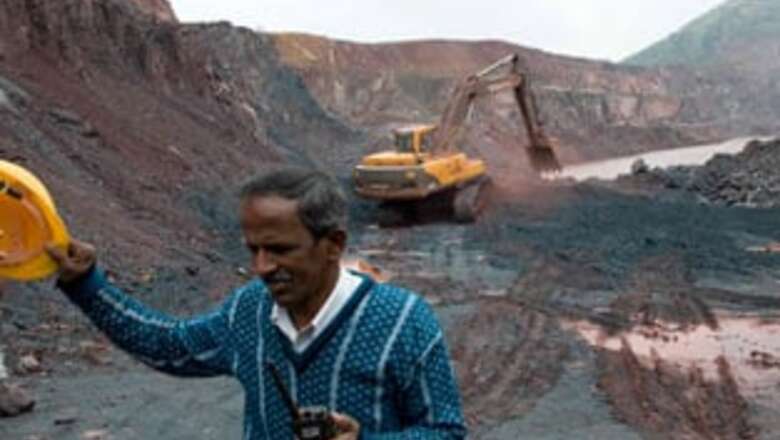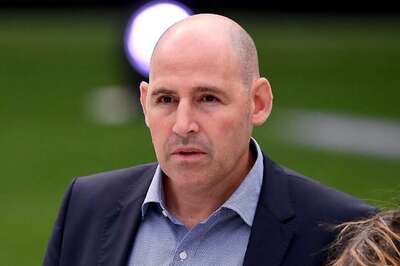
views
Bellary (Karnataka): The world around Palanivel is crumbling. Not long ago, he was a prosperous operator of 10 busy trucks in a booming business environment, but now faces personal ruin. His business has stalled. Increasing income has turned into a possibility of insolvency. The pride of being an employer is fast changing into the ignominy of loan default. All that he can look forward is to emerge from the mess and go back to his old profession - that of a driver.
The ambitious small businessman who earned a small fortune by riding India's economic boom in the last three years is just one of the millions of casualties of a global economic crisis that is reverberating from Wall Street's fallen banks to factories in China to iron ore mines in southern India.
Globalisation brought them opportunity and wealth, but now is taking away everything from them. And the speed of change has left them with little time to adjust.
"Fortune had smiled on me, Sir," the 35-year-old iron ore transporter says, adding almost immediately, "not anymore." The scene of Palanivel's misery is the mineral rich district of Bellary in Karnataka state, which this migrant from Tamil Nadu made his home two years ago.
In 2006, Palanivel heard that iron ore exports out of Bellary are booming, especially due to demand from China. He figured that all this iron ore would require transporting from the mines to ports and that he could play a role there. Palanivel had already grown from being a driver to the owner to two used trucks. He sold them and relocated with family to Hospet, a town in Bellary district. His bet paid off. To meet the robust demand for his services, Palanivel borrowed heavily and bought trucks in quick succession. He was soon making Rs 10,000 a day, unthinkable in his home town.
All went fine as long as iron ore found demand from China and other countries, prices kept rising and truckers were ever in demand. And one day in July, the bubble burst. In a matter of few weeks, commodity prices tumbled and demand vanished. Miners abandoned the caves. Even the insatiable China cut down buying. All of a sudden, truckers like Palanivel were left with no business and a lot of debt.
A billion tonnes to dig
A punishing sun and a terrain punctuated by hills of boulders can make the ride to Bellary a tedious one. But the visit is worth the while for the abundance of historic symbols from ancient Hindu temples of the Vijayanagara empire to British colonial bungalows that dot Bellary. In the last six years, however, visitors have been noticing an addition to the landscape. Iron ore mines had burst like blisters through farming fields that grew sorghum and rice until recently. The very large mines were always there, but the little ones spoke of a newfound pursuit. And some visitors, like Palanivel, stayed to make money off it.
In 2001, the commodity bull run was still two years away. But a construction boom in China and other emerging economies had begun. A lot of steel would be used in the ensuing years and the miners began a quest for more iron ore deposits. Bellary, with its one billion tonnes of proven reserves, was an ideal target.
Over the next few years, a mining frenzy took over the region. Large companies, small businessmen, farmers, politicians and migrants all jumped in. They dug for iron ore everywhere. "Digging" became the only English word commonly understood by everybody in the district. A class of newly rich emerged from mining profits. Flashy houses and imported cars revealed them to the world. You couldn't win an election there without the backing of the miners. Car dealers, banks and retailers opened shop. It seemed as though the world will never stop buying from Bellary.
"The whole world may not know where India is, but they sure know where Bellary is," proclaims Abdul Wahab, head of STC group of companies, local politician and a large miner. Bellary's role pivotal in increasing India's iron ore exports to China from 30 million tonnes in 2001 to 100 million tonnes in 2007. Just a decade ago, the district's sleepy mines produced a mere 4 lakh tonnes, but the output reached 40 million tonnes last year.
Mining began in Bellary in the 1960's when STC and another company owned by the Baldota family secured mining licences. However, they could only sell their output within India, which was a limited market. In the 1990s, the government allowed the export of iron ore, just in time to feed China's voracious appetite for the mineral.
A period of excess
By 2002, the linkages and the supply chains had firmly got established and the mining boom was fully in motion. Bellary's iron ore is a powdery low-grade variety, but it was taken by the market as soon as it was mined. Chennai, Karwar and Mangalore emerged as the ports where it would be shipped from. The news of the boom spread far and wide, attracting migrant entrepreneurs. Locals and outsides, alike, quickly grew rich, feeding into the frenzy further.
Luxury car dealers sensed the cash flow in Bellary and set up business. An eager population warmed up to the likes BMW, Maybach, Bentley and Maseratti. Nobody shied away from excess. "It is also about numbers. A few years ago, my family had two cars. Now I and my sons have 15," says Wahab, the politician-cum-miner.
The cocktail of money and politics soon made Bellary a power-broking centre. "It is now said that Bellary can change governments," Wahab asserts.
Industry officials say illegal mining has also proliferated in the district with political blessing. In Sandur, the third mining hub in the district along with Hospet and Bellary town, the rows of dug-up fields where ore-coated stones lie about tell the tale of farmers who gave up farming to open up their lands for iron ore.
The same sight presents itself in Taranagar village. "Traders, mostly supported by local politicians, lease land from the farmers. The farmers then dig the land for the stones that have iron ore content. Though the quality might be low, even these stones sold like hot cakes in the boom market," says Rajurappa, who uses a single name.
As the number of bank branches in Bellary district grew, miners and entrepreneurs of support services found the liquidity to fuel the boom. At the same time, families with large disposable income started looking for investment avenues. So, brokerages too, opened for business in Bellary, officially designated a backward district.
Fortune changed
When it came in July, it came without a warning. Just when the global iron ore industry was getting used to a record price of $175 per tonne, the Chinese demand started evaporating. The Beijing Olympics in August marked the end of an era of intense construction in China. The commodity markets, especially oil and iron ore, peaked and started a descent. The US financial markets, which had helped heat up commodity prices, were losing liquidity and started stumbling from one crisis to another. These distant events, only covered by local papers in Bellary marginally, proved a fatal flow to the mining industry as iron ore prices tanked to $50 a tonne. This was simply not enough to sustain the elaborate web of businesses and spending habits depending on the ore money.
Palanivel, the trucker from Tamil Nadu, had not factored all this in. "Production at the mines has dropped to almost nil and the freight rates have fallen by over 60 per cent. I have debts of over Rs 25 lakhs, Sir, and the bank wants to seize the trucks as I have defaulted on the last three instalment payments," he says. A glint of hope that the markets might revive keeps him in Bellary, but he is also making plans to return home.
About 100 kilometres away in Papanayakanalli, a village on the Hospet-Bellary road, Valmiki and his five childhood friends are also weighing the same option. Each of the six drivers now own at least one tipper truck that loads iron ore from the mines located in the hills near the village, and takes it to the railway station 12 kms away. In the last four months, their vehicles had been gathering dust. "It is after all these months that we finally got a trip today," says Valmiki, sipping tea at a roadside stall.
Old calculations no longer work. "Till four months ago, we used to get about three trips a day. Each trip would net us Rs. 1,500. But now it is only Rs. 800 and the trips are few. How will we pay the monthly instalment for the vehicles, each of which costs Rs 14 lakh," asks Valmiki, who owns two 15-ton vehicles.
The downtrend has punched a hole even in marital plans of Bellary youth. The youngest of the six friends, Babu Gowda, can't find a bride in these times. "Even fathers are now wary of marrying their daughters to us… They say we are in trouble," a friend reports.
The few tiny businesses that cropped up in Papanayakanalli, a village of 700 families, are vanishing. There had been a dhaba, a roadside food stall that catered to the miners, but is no longer there. Two tyre shops have also closed. "Within two years, Papanayakanalli got 110 tippers," says Valmiki. "Though we have land, farming is unviable as this region gets scanty rains. If the iron ore industry doesn't pick up, the whole village will be doomed."
Further down the narrow and mostly pothole-ridden road to Bellary, the gloom gets starker. Lined on both sides of the road are about 250 trucks, waiting for the night to set in. When the iron ore trucks used to clog the roads, the local administration had made a rule that they can pass only between 10 p.m. and 6 a.m. But the reasoning is irrelevant now. "Before the slowdown, up to 3,000 trucks used to line up here. The traffic has slowed down. So, what is the point in restricting these trucks," asks Abdur Rehman, a local farmer.
Drivers say even the few trucks that ply carry only half-loads, about 12 tonnes.
"The mine owners refuse to give more. The freight rates have also halved from almost Rs 1,200 a ton to Rs 600 now," says a driver. The discussion veers to the lack of Chinese demand and liquidity crunch in the global market. Reflecting for a moment, a second driver asks innocently, "If there is no money in the market, why can't the government just print more notes?"
Lenders beware
In Bellary, Kiran Kumar would doubtless wish he could catch hold of a currency-printing machine. The 27 year-old works in the collection department of the local branch of e-Nxt Financials Ltd., a Tata Capital subsidiary that provides loans to buy vehicles. Among the team that is in charge of collecting monthly installments from buyers of heavy commercial vehicles like trucks and tippers, Kumar is under pressure from head office to maintain is collection record. Affected by the slowdown that impaired their paying capacity, Kumar's clients have piled up installment dues of Rs 1.7 crore in just two months. It has come as a rude shock for Kumar, who had just been promoted to the post of assistant manager earlier this year.
"Normally it takes about three years to get to the post. Kumar did it in half the time," says colleague Nagraj Math, a business development executive in the branch. Kumar had then benefited from the iron ore boom. Flush with money, truck and tipper owners used to pay more than what the monthly installment required, sometime even Rs 2 lakh more. "It is not for nothing that Bellary had the best collection record in the state. But that was till August. Now it is down to the third position," says Kumar.
His agents are now extra careful when they go to clients to collect the monthly installments. "Clients threaten they will commit suicide if we ask for money. A few have already sold their vehicles. One of them said, 'OK, go ahead, seize my truck. But I don't know where it is'" Kumar says.
The only option for e-Nxt and other finance companies, in most cases, has been to seize trucks and tippers. Local transporters reckon that about 2,000 trucks have already been taken back. "If the slowdown in the iron ore industry continues, at least half of the 20,000 vehicles will be seized," says , director of the Hospet-based ILC Industries Ltd, a logistics company, and also the head of the local transporters' association, K Chandrashekar.
However, there are some who have converted the situation to their advantage. Ramesh, a resident of Hospet, owns 3 acres. It was too much of space for his lone cow until the local branch of Sundaram Finance advised him of a better and more profitable use – as a parking lot for the seized vehicles. Ramesh accepted. There are about 70 tippers and trucks resting there now and he earns Rs 25 per day for each of them, which is more than Rs 50,000 a month. Now, his father ties the cow outside, along the road.
Car sales have plunged too. Local dealers of Maruti Suzuki and Tata Motors say that passenger car numbers have declined by 30 per cent in the last two months and sales of bigger vehicles like trucks have fallen by more than 50 per cent. "Multi-utility vehicles like Tata's Sumo and Safari and Mahindra's Bolero are popular among the miners. Their sales are also down by half from last year," says Director of Bhagyodaya Motors, Tata dealer in Hospet, G Vishwanath.
"Though availability of finance is a factor, the local auto market is dependent on the iron ore industry. With the present slowdown in the mines, auto sales have been hit. We expect the coming months to be worse," adds Vishwanath.
The slowdown has begun to reflect in the local consumer's spending. Praveen Jain owns a readymade garments shop in the heart of Hospet.
"Earlier I used to make Rs 25,000 a day, now it is down to Rs 5,000 a day in the last two months," says Jain. Eating and drinking patterns have also changed. Suresh Shetty, hotelier and head of the local hoteliers' association in Hospet, saw clientele in his three bars in the district losing the highs of the last two years. "Now instead of two beers, people drink one bottle. Many have shifted from foreign liquors to locally made Raj rum and Raj whisky," says Shetty. The most drastic impact has been seen in his low-end bar near the JSW Steel plant. "Many of the contract laborers, who have been laid off, have gone back to their native places," says Shetty.
Even the investing community in the district has gone bearish, affected both by the iron ore industry and the crash in stock markets. "Till two months ago, I had a daily turnover of Rs 10 crore. Today, it is down to Rs 1-2 crore," says Kiran Kumar Soni, who runs the local franchise for Motilal Oswal Securities. Soni claims his is the first and the largest online brokerage outlet in the district with 1,500 members. Pointing to a deserted barricade at one corner of the office, he remarks, "Till two months ago, we used to have so much of crowd that I had to ask investors to queue up along the barricade." Now a few senior citizens sit there, emptily staring at the monitors.
Pile-up from the past
The partying has slowed down now and there is a feeling of a bad hangover all over the district. Two of the 25 bigger miners have already closed operations. Even the biggest miner – MSPL Ltd – has cut down its daily shifts from three to two. "We expect our annual production to drop by 30% from 6 million tonnes last year," says Whole Time Director Rahul Baldota. Wahab's sponge iron company KMMI Ispat has shut down three of its 10 kilns. About 25,000 tons of low-grade iron ore is lying around in the closed mines of TNR Mines. Four months ago, the pile was valued at over Rs. 75 lakh. Today it is only Rs 6.5 lakh. Similar instances abound around the mines in Bellary.
"Retrenchment has begun. About three lakh people are directly and indirectly dependent on the iron ore industry for their livelihood. Many of the labourers, be it at the mines or farm land, have already gone home," says Wahab.
Caught in the financial trap are Olli and his family, who migrated to Sandur from their village hundreds of kilometres away, lured by the princely wage of Rs. 200 a day. But by the time they reached, the slowdown had set in. Wages plummeted to Rs. 40 a day, hardly justifying the relocation. "I need at least Rs. 800 to buy bus tickets to go back. I will be here till I save that much money," says Olli.
"Coming here to Bellary had been a mistake."
Prince Mathews Thomas is a Special Correspondent at the new business magazine to be launched by Network18 in alliance with Forbes, USA.


















Comments
0 comment